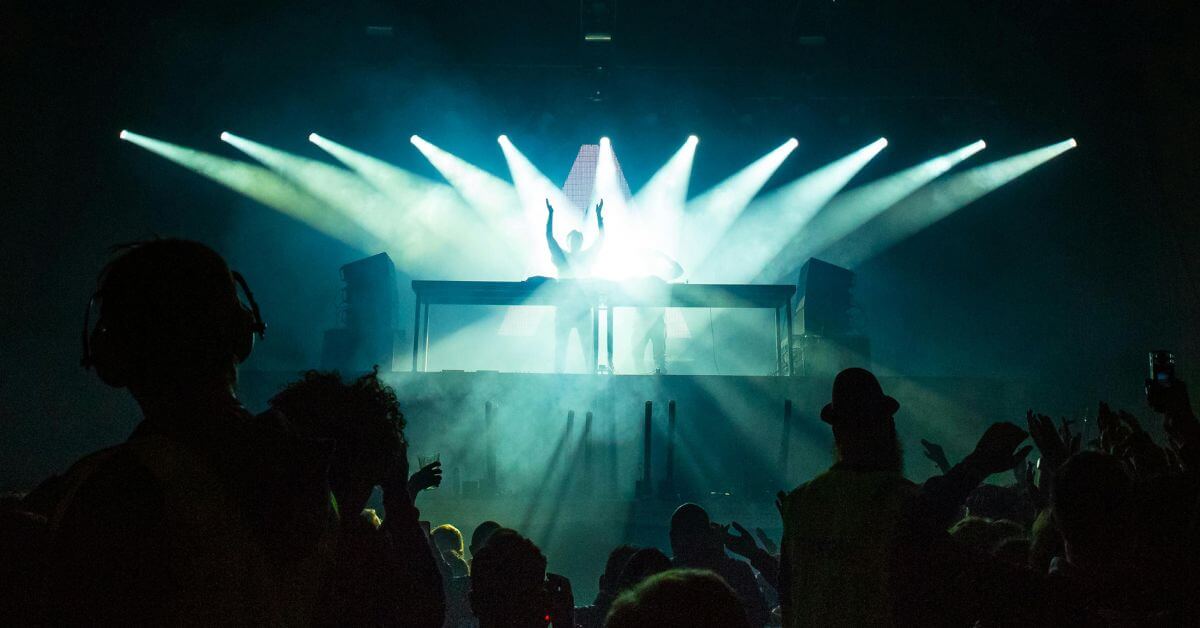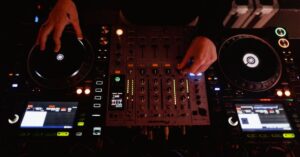In this blog post, I want to share some tips from my own experience on how you can get your tracks out there as an up-and-coming producer, so they get played by top DJs in popular clubs, at festivals, or in podcast series.
Getting your music played by influential DJs can be a game-changer for any producer, especially in genres like techno, house, and other electronic styles, which I would consider dancefloor music. DJs are often tastemakers, breaking new tracks and bringing them to the forefront of the underground and club scenes. If your track gets dropped in the right set, it can open doors to new opportunities. But getting your music into the hands of the right DJs isn’t just about luck – it’s about strategy, timing, and relationship-building.
Even though it can be a great marketing tool, you need to be aware that sending your creative property – your music – for free doesn’t bring you any direct financial benefits. If you don’t want to further fuel the imbalance between high DJ fees and the often modest income of producers, you should carefully consider whether you want to send your art for free.
Prepare your music for playing
First, you need to make sure your tracks are at a playable level, so they can hold up in a DJ set alongside professionally mastered tracks. This is easier said than done, but in my experience, it’s enough if your tracks have a solid mix – you can achieve this through referencing – and you make sure your demos are brought to a reasonable volume without heavy mastering. If you want to know what a suitable volume level for techno is, feel free to also check out my blog post on mastering. This way, your tracks won’t stand out negatively due to a volume difference, but only – and even then, only to a professional listener – due to a lack of compression in some parts.
Know your target audience
Next, you need to be clear about where you want your music to be played. If you want your tracks to be featured at major EDM festivals, first you need to ensure that your music fits the genre and meets industry standards in terms of quality. After that, you should do some market research to find out which DJs and labels are prominent in the scene you’re aiming for and who play your style of music. Once you have a list of all the artists that might be a good fit, you can systematically work through it and start contacting them one by one.
Getting in contact with professional DJs
Now that you have a list of DJs who could potentially be interested in your tracks, the next step is to reach out to them and get them to listen to your music. Thankfully, we live in the digital age, so you no longer have to send vinyl by mail. Today, there are extremely effective ways to approach DJs and artists through social media and the internet:
- Instagram / Facebook
- (promo)-email
- SoundCloud
- Manager / agent
In my opinion, this list represents the most effective ways to get in touch with DJs. From my experience, Instagram has proven to be the most powerful tool, with a very high response rate, even from established DJs. Instagram is especially useful because even the biggest stars often handle their own accounts, and through your profile, you can immediately establish social proof and relevance. So don’t hesitate to slide into their DMs!
After Instagram, the more formal route via email has also proven to be very effective. Of course, this requires a bit of research to find the right email address for the artist. However, since many DJs rely on promos and fresh music, they often have dedicated promo email addresses, which you can usually find through their social media channels.
If all else fails, you can also try SoundCloud or Bandcamp. These platforms offer contact options as well, but in my experience, their usability for this type of communication is poor, and they are rarely used for such purposes. That doesn’t mean you shouldn’t give them a shot, though.
Lastly, there’s the option of going through the artist’s management or agent. This is like playing a wild card and should really only be used if you’re absolutely confident in your music and are sure the artist will love your tracks. This wild card shouldn’t be played too often, as it can come across as pushy, and you might quickly be ignored. It’s a fine line between being persistent and knowing where the boundaries are!
Send professional promos
When sending promo emails or messages, it’s important to be as brief as possible while still providing all the necessary information. The DJs you contact receive hundreds of messages daily and don’t have time to read lengthy emails. A short introduction of 1-2 sentences where you introduce yourself and explain what you’re requesting is sufficient. Ultimately, it’s the music that should do the talking. If the music is good, they’ll get back to you and possibly want to know more.
This brings me to the next point: never send music as an email attachment. Instead, use streaming/download links. Large music files as attachments can quickly fill up email inboxes, leading to lost attachments or emails that don’t get through. Therefore, simply send a private SoundCloud link or a Google Drive/Dropbox link. Personally, I prefer SoundCloud for this purpose because it displays the cover art directly and also provides a personal touch through the SoundCloud account.
Speaking of cover art, it’s advisable to include a cover with your demos. DJs often use visual cues like cover art to navigate their library. This helps you stand out and provides a greater sense of recognition than just the name alone. Lastly, make sure your tracks are correctly labeled. The artists need to know exactly who the track is from so they can provide feedback. It’s best to include this information directly in the metadata of the AIFF or WAV file as well as in the title.
Conclusion
Getting your music played by influential DJs can greatly enhance your career as a producer, opening doors to new opportunities and expanding your audience. By implementing the strategies outlined in this post, I’ve managed to have my tracks featured in renowned clubs like Berghain and Bassiani, played by respected DJs. By preparing your tracks to a professional standard, understanding your target audience, and reaching out to DJs effectively, you too can boost your chances of being noticed in the competitive electronic music scene.
Remember, the key to success lies not only in the quality of your music but also in how you present and promote it. Approach DJs with well-crafted, professional promos, and utilise digital platforms to your advantage. Always aim to build genuine relationships within the industry, as these connections can lead to valuable exposure and collaborations.







